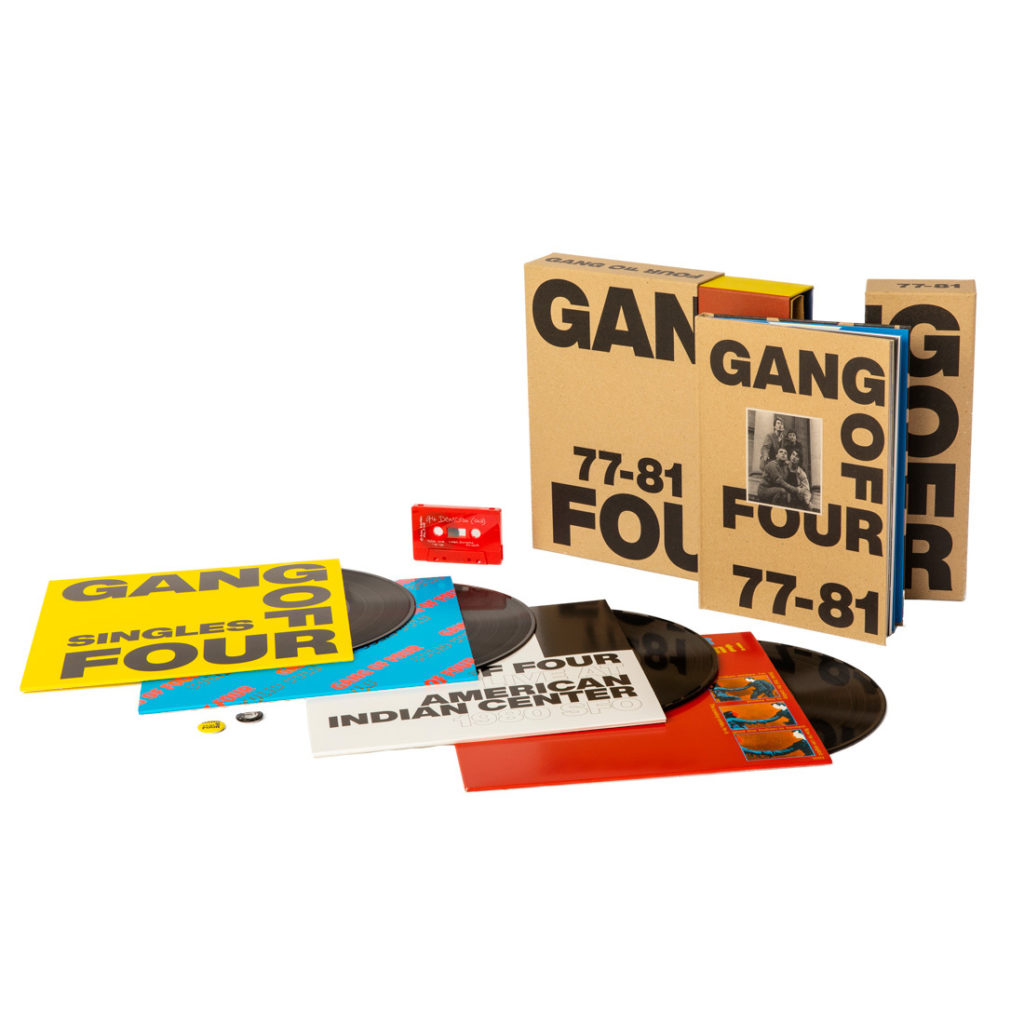“The producer, a classic toff, said, ‘We would have liked you to have used the word “rubbish”,’” King recalls. “We all did a double take and said, ‘What do you mean? Then no one would know that we changed it.’” Having opposed I Found That Essence Rare’s release, the group were keen to take advantage of the nationwide exposure Top Of The Pops offered, but wanted people to know they’d been forced to compromise. “We wanted to not miss that commercial opportunity, but to make it obvious that we’d been censored,” King says. Locked in a stalemate, “We told them to fuck off.”
“I’d smash it to pieces and there’d be blood flying around”
It’s doubtful whether the BBC were prepared for Gang Of Four’s incendiary live shows, which had become as uncompromising as their studio recordings. Shortly after walking out of the Top Of The Pops studio, the group were touring the US, once again in support of Buzzcocks. “Any night we weren’t playing with Buzzcocks, we used to do our own double shows,” King recalls. “So in 30 days we probably played like 38 or 40 times… It was quite intense, and we got quite good.”
On 22 May 1980, the group descended on San Francisco’s American Indian Center – a fitting venue for a band whose debut album’s artwork offered a Situationist-inspired comment on the way Native Americans had been tricked into dispossession. “We were really chuffed to get a gig there at all, because Gill was obsessed with Native American culture,” King says. As the band performed in front of a poster of chief Sitting Bull emblazoned with the word “landlord”, the show was recorded for broadcast by local radio – and, capturing Gang Of Four on the verge of their US breakthrough, became heavily bootlegged. It has now been given an official release as part of the Gang Of Four: 79-81 box set.
“It was a warm up to the show which was our sort of great breakthrough in America,” King recalls. “It was probably one of the most intense shows we ever played. It was unbelievably hot, and we were on another level of everything that we were going to do.”
During a performance of He’d Send In The Army, which equated patriarchal behaviour in the home with the tyrannical behaviour of wartime generals, King battered a washing-machine lid. “At first it was just trying to make a very sharp percussive sound,” he says. “Initially we rigged up a bit of scaffolding pipe on steel wire, which I would then hit wit a chair leg or something. But everything has a meaning to it, and using consumer goods means something” – especially when they’re associated with the oppressive roles wives were expected to assume as domestic labourers.
“That became my all-time favourite live cut to perform,” King says. “It almost became a strange sort of performance-art funk piece. We’d pause and there’d be really long gaps – sometimes we’d play it without making any noise at all for, like, 20 seconds. We would stop, I’d be hitting some percussion thing with a hammer or a pipe, and Andy would be playing on the off beat on guitar. We often tried to put each other off.”
The band’s live shows only intensified form here on out. Before long, microwaves – salvaged from local dumps – replaced the washing-machine lid. “They sounded fantastic,” King recalls. “A microwave being smashed to pieces thrilled the audience and it became an extraordinarily important part of the show.” He’d Send In The Army evolved into “this very powerful, sort of improvised song with dropouts”, King continues. “And then visually you’d have this microwave and I’d smash it to pieces – the smashing of things that oppress us. Glass would fly all over; I’d very often cut myself and there’d be blood flying around.”
Almost turning on their audience as their live show developed, the group would “sometimes move forward together – not in a choreographed Shadows way – but we’d move toward the front of the stage; we’d swap positions and move around fast, and sometimes the audience would back away from us. It was sort of like being wind in a wheat field.” When members of the National Front and Leeds-based fascist movements tried to cause problems at shows, the band weren’t averse to mounting a defence. On occasion, they even targeted each other: after one gig, Andy Gill and Dave Allen came to blows during an argument over whether putting a foot on the monitor was “too rockist”. Meanwhile, Kerrang! named Gang Of Four the second-loudest band in Britain.
“The determination was to make something really heavy and propulsive”
A centrepiece of their live shows, He’d Send In The Army also closed the group’s second album, Solid Gold, released in March 1981. Graduating to Abbey Road’s hallowed Studio Two, where The Beatles had recorded most of their albums and Pink Floyd went stratospheric with The Dark Side Of The Moon, Gang Of Four teamed up with producer Jimmy Douglass – then helping fashion Ohio-based funk band Slave’s early 80s records – and set about making a “much heavier funk” record than Entertainment!
“We were delighted to get hold of Jimmy Douglass,” King says. “Funk was a really, really important thing, because we liked dancing – we danced all the time.” Released as the second single from Solid Gold, What We All Want exemplified their ambition. “Hugo and Dave had come up with this relentless grinding riff,” King explains. “They would be doing this powerful riff that was like [German experimentalists] Can and Slave mixed up in Dave’s playing. It gave that sort of propulsive thing that went on… I had friends in hip-hop bands that said it was sort of that proto-thing – it’s like sampling, but playing the sample. It doesn’t ever change. It just goes on and on and on, and you’re sort of improvising on top of it.”





